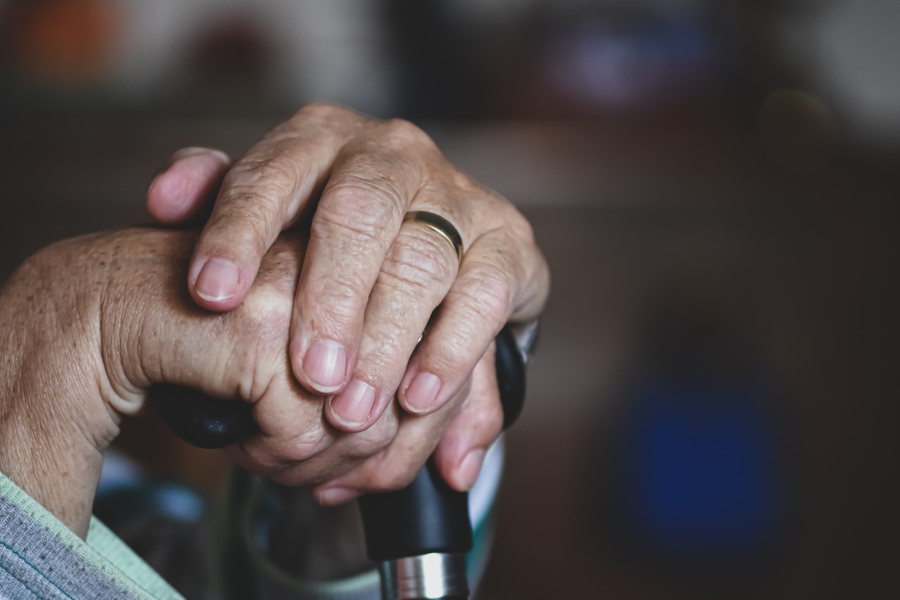Grief is often associated with the loss of a loved one through death, but it can take on many different forms. Grief can result from any situation in which there is a form of loss or anticipated loss. Examples include the end of a relationship, a significant life change, or a grim diagnosis for a friend or family member.
And when it comes to mourning someone still alive, the emotions and challenges can be even more complex and confusing. Dealing with difficult experiences, such as a loved one facing a serious illness or a rapidly changing relationship, can be difficult to endure due to the pain and uncertainty of loss that almost always accompanies these situations.
In this article, we’ll delve into the emotional complexity of grieving someone who is still physically with us, but emotionally distant or changed in a way that feels like a loss. The aim is to provide a safe space to process this kind of heartache and to offer practical tools and guidance to help you navigate these challenging waters. Whether you’re seeking solace for yourself or looking to support someone close to you, hopefully you will find comfort and understanding in these resources.
Common Examples of Grieving Someone Who’s Still Alive
Ambiguous Loss
In some cases, you may be grieving someone who is still living because they have fundamentally changed in a way that ends the relationship as it has previously been experienced. Dr. Pauline Boss coined the term ambiguous loss to describe this type of grief. Ambiguous loss refers to the feelings of grief, confusion, and uncertainty that can occur when someone is mourning the loss of a loved one who is still alive but fundamentally not the same person they used to be. Common examples of ambiguous loss include the following:
- Mental illness
- Alzheimer’s disease or dementia
- Brain injury
- Drug addiction

Anticipatory Grief
In other cases, you may feel anticipatory grief, which describes the process of grieving caused by an impending loss.
- Terminal illness: If a loved one has been diagnosed with a poor prognosis, their family and friends may begin to experience anticipatory grief as they prepare for the eventual loss.
- Aging and declining health: As a person gets older and their health begins to decline, family members and caregivers may start to experience anticipatory grief as they come to terms with their loved one’s limited time.
Grief From a Major Life Change
Grief from a major life change refers to the feelings of sadness, anger, and loss that can occur when a significant relationship ends.
- Estrangement or cutting off communication with a family member: When someone decides to end contact with a family member, they may experience living loss and grieve the relationship that they once had with the family member. This can be particularly hard if the decision to end communication was a difficult one or if the family member was close to the person in the past.
- Divorce or separation: Ending a marriage or a long-term relationship can also result in living loss. Despite the fact that their former partner or spouse is still living, an individual may experience grief over the end of their relationship, the shattered hopes and dreams they once had, and the future they had imagined together.
Symptoms of Grief
Grief can be a confusing and unpredictable journey, and how it manifests itself may differ greatly from person to person. However, some common experiences include the following:
- Emotional distress: Feelings of sadness, anger, guilt, or despair.
- Physical symptoms: Grief can take a toll on your body, leaving you feeling drained, with changes in your appetite, disrupted sleep patterns, or physical aches and pains.
- Behavioural shifts: You may feel the need to distance yourself from social activities or find yourself struggling in your usual work routine.
- Cognitive changes: Grief can cloud your thoughts and make it hard to focus, retain information, or make decisions.
- Spiritual or existential struggles: You may question your beliefs or feel a sense of emptiness or like life has no meaning.
How is Grief Different When Someone is Still Alive?
Grieving someone who is still alive can be particularly challenging for several reasons, including:
- The lack of closure: When someone is still alive, it can be difficult to come to terms with their loss and to move forward in your grieving process. This can be especially challenging if the person you are grieving is facing a long-term illness or decline in health, as the uncertainty and ambiguity can make it difficult to find closure.
- The guilt: When you are grieving someone who is still alive, it can be difficult to come to terms with your feelings of sadness and loss. You may feel guilty for experiencing these emotions, especially if your loved one is still alive and facing their own challenges.
- The social stigma: Grief is often associated with death, so it can be challenging to find support and understanding when grieving someone who is still alive. Society often does not recognize the depth of loss and pain that can occur in these situations, making it difficult to find the support you need.
- The complexity: Grieving someone who is still alive can be particularly challenging because it can involve a complex mix of emotions, including sadness, anger, guilt, and confusion. This can make it difficult to understand your emotions and find the required support.
- The fear of losing them: When you are grieving someone who is still living, you may be faced with the fear of losing them in the future. This can be particularly challenging if they are facing a serious illness or decline in health and can add an additional layer of anxiety and stress to your grieving process.
Coping with Grief
Embrace and validate your emotions
The mixed emotions accompanying mourning the loss of someone still living can be intense and overwhelming. However, try to resist the temptation to suppress or avoid those feelings.
Be mindful and try not to judge yourself. Remember, grieving is not a linear process and there is no specific or proper way to grieve. The only way to truly heal is to embrace and experience your painful feelings fully. Patiently allow yourself to feel and express your emotions and remember to lean on loved ones or a mental health professional for support when needed.
Connect with a support system
Grieving the loss of someone still alive can be a lonely and isolating experience. While others may not understand your suffering, the healing process will never occur if you are unable to share your feelings.
Remember to seek support from those who love and care about you. Use open and honest communication, even if they do not understand your perspective entirely. Utilizing your support system of friends and family for strength can provide comfort and help you feel less isolated.

Find others in the same situation
Finding others who are going through a similar situation can provide comfort and support because they are more likely to understand what you are going through. For instance, joining a support group led by trained facilitators can provide a safe and supportive environment. Alternatively, you can connect with others in similar situations through online communities and forums.
Goodbye Rituals
Goodbye rituals can be a powerful tool in promoting closure when grieving someone still living. These may include writing your loved one a letter, creating a memorial, engaging in a symbolic gesture or attending a farewell event.
Goodbye rituals can be essential to the grieving process because they provide a sense of closure and comfort.
Work through unfinished business with a therapist
Sometimes the most difficult part of mourning is that you may have “unfinished business.” “Unfinished business” is a term therapists use to refer to unresolved matters or lingering feelings from the past that continue to affect someone in the present.
Unfinished business can be processed with the help of a mental health professional. For instance, in emotion-focused therapy, the unfinished business task, also known as the empty-chair technique, is used to help individuals process unresolved feelings and conflicts. The task involves having the individual imagine two chairs, one for themself and one for a significant other, friend, or family member with whom they have an unresolved issue.
This task helps people to work through their emotions and resolve any conflicts or unfinished business that may be causing distress or hindering their growth and well-being. This technique can be a powerful tool for exploring and processing emotions and can help individuals gain insight and find closure in areas of their life where they may have felt stuck.

Allow yourself time to mourn
Healing from grief is a journey like no other. Don’t be in a rush to push through your feelings or suppress them. Instead, give yourself the necessary time and space to process what you are going through. This may mean temporarily relinquishing your daily routine, seeking support from loved ones, or simply spending time alone with your thoughts.
Trust the process and know that everyone heals differently. Embrace your unique journey and be kind to yourself along the way. Grief is not linear: It can be unpredictable and can come in waves. Remembering that it’s normal to experience ups and downs as you navigate this journey is vital.

Practice self-care
In the midst of grief, it’s essential to prioritize self-care. You deserve love and care, just as much as the person you lost. Whether it’s taking a relaxing bath, going for a walk in nature, or indulging in a favourite hobby, make time for activities that bring you joy and peace. Treat yourself with kindness and understanding. Remember to assert boundaries and say no to things that don’t serve your well-being.
Conclusion
Grieving someone who is still alive can be a painful and overwhelming experience. Remember that holding onto hope in the face of this pain is crucial. Whether you face ambiguous loss, anticipatory grief or a major life change, you can take steps to alleviate the pain and move forward.
You can navigate this journey toward healing and peace by seeking solace from your support system, allowing yourself to truly experience and express your emotions, practising self-care, and allowing yourself the time and space to heal.
Your grief is unique and personal – there is no right or wrong way to navigate it. Surrounding yourself with people who genuinely understand and care about you can provide comfort and encouragement during your most difficult moments. Therapists and support groups are also available to assist you in finding ways to heal.
Though the road ahead may seem difficult, know that with each passing day, the pain will begin to ease and you will be able to embrace the memories of your loved one with fondness and joy. Embrace the healing journey and hold onto hope for a brighter tomorrow.
FAQs
What is unconventional grief?
Unconventional grief refers to the process of grieving a non-death loss, such as the loss of a job, a relationship, or a pet. This type of grief can be just as complex and challenging as grieving after a death and can lead to a wide range of emotions and reactions.
What is ambiguous grieving?
Ambiguous grieving occurs when there is no clear or concrete reason for a loss, or when the loss is not openly acknowledged. This can make the grieving process more difficult, as the individual may struggle to come to terms with their feelings.
What is it called when you grieve someone who is still alive?
Grieving someone who is still alive can fall under different categories such as anticipatory grief, unconventional grief, or ambiguous grief depending on the circumstances. Therefore, there is no specific term for it, but it is a valid form of grief that can be complex and challenging to navigate.
What is anticipatory grief?
This type of grief occurs when an individual begins to grieve for the loss of someone they know will soon pass away or when they have already lost a loved one emotionally or psychologically, even though they are still physically present in their lives.








